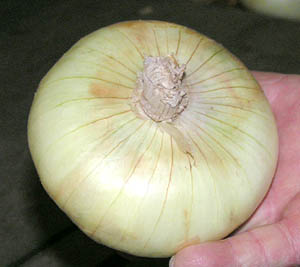The first Sweet Vidalia onions of the season appeared in our grocery store this week. Their presence brought to mind a chapter of the first book I wrote…the one about my father that led to an agent but not to a contract. Not for this book, at least. So today, in honor of Father’s Day and Sweet Vidalias, enjoy this chapter from the unpublished manuscript. It’s much longer than my usual posts, but the timing is perfect. This story takes place right after Mom, my sister, brother, and I meet with the undertaker and decided to purchase plaid boxers for Dad to wear at his funeral…under his suit, of course.
Courtin’ Onions
So then, you shall know them by their fruits.
Matthew 7: 20
The underwear dilemma successfully resolved, a multitude of decisions rushed in to fill the vacuum created in its wake. What kind of casket? The farm scene one, of course. How sturdy a vault? “The cheapest one,” we chorused, all remembering Dad’s comment at the same funeral home when selecting his father’s final resting place over thirty years before. “Why buy the most expensive vault, guaranteed to last who knows how many years? They’re just gonna’ bury the thing, for Pete’s sake,” Dad declared, leaving little doubt where he sat on the issue.
We honored his wishes and soothed our own frugal souls, sticking to the bargain basement model. We chose the bulletin with the windmill and the Scriptures about endurance and rising up to walk. Some controversy arose concerning the music for the service. We kids wanted The Old Gray Mare, I’ve Been Workin’ on the Railroad, and Sioux City Sioux, but Mom held out for more traditional fare, allowing Dad’s Passenger Seat Top Forty a brief airing during the luncheon after the service and internment.
Great-uncle Burnell, a former plumber and pipe layer whose memory contained a map of the entire underground terrain of Nevada, Iowa, where Dad was to be buried, was on the phone. He assured us that he was consulting with the cemetery crew concerning the exact location of Dad’s future digs.
“Say,” he hollered over the phone, after describing in detail the precise drainage characteristics and soil qualities of the earth Dad would displace. His raspy voice grated across the wires like gravel, “Anybody told Willie ‘bout Harlan bein’ dead? Want me ta go over and do it?”
Mom held her hand over the mouthpiece and whispered, “Burnell wants to know if he should go tell Willie. What do you think?” She hesitated. Burnell had a heart of pure gold, but when in the presence of strong emotion he lacked skill in the tact department, and his best intentions were sometimes misinterpreted.
“Tell him that you and I are going to see Willie,” John advised Mom. “Tell him you want to visit Willie yourself.”
Willie New was a shadowy figure from our parents’ past, one of the people they often spoke of but rarely saw. Once Dad and Mom left Nevada, the small central Iowa town where they lived for the first three years of their marriage, Willie hovered around the edges of their lives, seldom making an actual appearance. Willie and Dad met when both were young men farming near Nevada. They shared a love for cattle that bonded their friendship. Each was his parents’ only child, so each filled for the other the empty space in their lives. Willie filled that space amply, for he was a big guy. Standing beside Dad, grinning proudly from his place of honor as best man, Willie is the only person in my parents’ wedding party whose cubic footage topped the groom’s. Holding the ring and passing it on was as close as Willie ever came to a wedding band, and his bachelor life suited him just fine.
On trips to Nevada, Dad and Willie occasionally visited, though Willie didn’t like crowds too much. Mostly Willie kept in touch through the sending of an annual Christmas card, but we learned more about him via the grapevine gossip Dad’s two elderly aunts passed along from time to time.
“Tell Harlan,” Aunt Ginnie’s voice gained volume when talking long distance in an effort to push the words along the miles of wire. “Tell Harlan Willie’s building himself a little house in town. He don’t think it’s safe for him to live on the home place alone, now that his parents is gone.”
“Harlan,” Aunt Gladys wrote in Dad’s birthday card, “Willie New, your old friend, he just found out he’s got the diabetes, just like you. Hit him awful bad, he’s not doing a bit good, and he just don’t get out much anymore. He’s still livin’ in that new house he built, and someone comes in to check on him. I heard it at church circle and thought I’d better tell you. Sorry the news isn’t any better from down here, but we’re all getting old, you know.”
Mom and John headed to Nevada, to that new house of Willie’s, to tell an old man that the friend of his youth was dead. They were somber as they left on the errand, unsure of how Willie, in his own fragile state of health, would handle the news. When they returned from the mission, the smiles on their faces told me a story was in the works.
“How’d Willie take the news?” Jill and I waited impatiently as they entered the kitchen and sat down before answering.
Mom was chuckling as she began to talk. “Well, we told Willie, and he was quiet for awhile as you’d expect. Then he said, ‘Dorothy, I don’t think I’ll come to the funeral. I don’t get around real good, and I don’t like crowds much. Maybe Dick Suttle, he helps me with my shoppin’, ya know, can bring me to the funeral home. I’d like to see Harlan one more time.’ I told him that was a good plan, and I understood that he couldn’t come to the funeral. Then we talked for a bit, and you’ll never guess what Willie said.”
John sat on a tall stool at the kitchen island, the grin on his face assuring us that the best was yet to come. “Willie’s quite a talker, you know, very smooth…” he began.
Mom interrupted, not willing to let John steal her thunder. “Willie said, ‘Dorothy, you took care of Harlan all those years. He couldn’t have asked for a better wife. You got nothing to be ashamed of, ya know that?’ I told him I knew that, and then he said…I just can’t believe he said this…”
“He made her quite an offer. You want me to tell ‘em what it was?” John nudged the story along.
“Alright, John, let me finish,” Mom snapped. “Willie said, ‘Dorothy,’ in that high nasal voice of his, ‘Dorothy, you get lonely, you can come live with me. I got a whole apartment in the basement. You could live down there and come up here and take care of me. You could even drive that Cadillac I got sittin’ in the garage out there.’”
Jill and I looked at one another, and I wondered if she was having as hard a time as I was imagining our frugal mother steering a blatantly extravagant Cadillac around Nevada, Iowa. Jill burst out, “I certainly hope you told him no.” Apparently the horror of Mom jumping out of the frying pan of Dad’s convalescence into the fire of Willie’s failing health took precedence over the Cadillac vision for her.
“Told you it was quite an offer,” John teased.
“Of course I told him no, but I had to do it nicely. ‘Willie,’ I said, ‘I’ve spent most of my life raising kids and caring for a sick husband. I believe I need a break. I’ve had enough sickness, don’t you think?’”
“Let him down real easy, didn’t she?” John baited her. “He was a little disappointed, but I think he’ll recover.”
“John, let me finish this story. Willie said, ‘Dorothy, you’re right. You don’t need no more sickness. I understand.’ I told him I would visit him now and then. I think that helped.”
“Don’t you ever, ever say yes to an offer like that,” Jill lectured Mom. “You deserve your own life now.”
“Don’t worry, Jill, I have no intention of tying myself down. I made myself perfectly clear.”
Willie, however, was not so easily discouraged. He made it to the funeral home for visitation, shuffling along behind his walker, across the long room to where Dad lay in the casket with the farm scene decorating the shiny satin underside of the lid. Willie looked at the carved wooden cow held in lifeless hands and bowed his head for a long time. “Dorothy,” he shook himself out of the past he had shared with his friend and spoke as she came up beside him, “ya done good. He woulda liked that.”
“Thanks for coming, Willie. It means a lot.” Mom shook his hand and hovered over him as he shuffled out of the room and down the stairs outside.
“Mom,” we teased her when she returned, “quit leading the poor man on.”
“Would you three just stop for once,” she retorted and huffed off to talk to Uncle Burnell and Aunt Ginnie.
A month or two later, Mom called and said, “You’ll never guess who stopped by.” I didn’t even try. “Willie New!”
“How in the world did Willie get to Boone? He can’t drive can he?”
“No, Dick Suttle brought him over.”
“What for?” I was getting curious.
“He likes to shop at Peoples’ Clothing downtown. They carry work clothes in big and tall sizes. Willie said he gets most of his clothes there.”
“So he stopped in to say hi when they were done. That’s nice.” The visit was starting to make a little more sense. “Did he and Dick stay long?”
“That’s the funny part, Jolene. Willie didn’t even come in. The doorbell rang and I opened the door, and there he was, holding an onion in his hand.”
“Did you say ‘an onion’?”
“Yes,” Mom laughed. “He stood there holding the onion. ‘Sweet Vidalia,’ Willie explained. ‘I buy ‘em in ten pound bags every spring and take them ‘round to all my friends. They’re a real sweet onion. This’uns for you, Dorothy.’ I really didn’t know what to say,” Mom went on.
“Sounds like he was making a move, Mom,” I couldn’t resist. “Did you invite him in?”
“Good grief, Jolene. He said he couldn’t stay, he just wanted to give me the onion.”
“You know what that sounds like to me?” I asked.
“What?”
“I think that was a courtin’ onion…”
“Jolene!”
“Well, Mom, some men give flowers, some give candy, but Willie has it all over them. He brought you an onion. You better be careful or someday he might bring you the whole ten pound bag.”
“Would you please stop?”
I couldn’t wait to share the story with Hiram and the kids when I got off the phone. Then, I called my brother and my sister.
“Smooth, that man is smooth,” John boomed over the line.
“An onion? An actual onion?” Jill double checked the facts.
“Not just any onion,” I corrected. “A Sweet Vidalia.” We laughed until we cried imagining Willie at the door, paying homage to my mother, recognizing and honoring her faithfulness with the humblest of gifts. A rose by any other name could never have smelled as sweet.
When sweet onions are in season, I only buy the Sweet Vidalias. I pass up the red onions, the Walla Walla Sweets, and the Colorado Sweets, and head straight for the courtin’ onions.
“Courtin’ onions are in,” I call and tell my mother when I first see them in the store.
“Jolene.” The one word is tinged with impatience as I exasperate her again.
I can’t find words to tell her what those onions and Willie’s offering of them means to me. “We are known by our fruits,” Jesus said, and as I look at my mother’s life, I know that is true. She finished school, raised three kids, taught for thirty-eight years, and through it all cared for her husband, never thinking of walking away. The strain of it nearly broke her a few times, and she was too stubborn to seek or to accept help, too proud to admit weakness, too determined to do it all alone. But, the mistakes she made were covered by her devotion to a righteous cause and her absolute commitment to the promises she made in her wedding vows. God knew her heart and, when her duties were done, honored her with a fruit that matched her character, delivered by a messenger who knew her worth.
The fruits of the spirit are love, joy, peace, patience, kindness, goodness, faithfulness, gentleness, and self-control; but if possible, I would like to enter into that exalted list one more: a Sweet Vidalia onion, hearty and healthful, its zippy bite tempered by sweetness, its flavor permeating whatever dish it graces. Its presence there stands, at least for me, as a perfect reminder of my mother’s extraordinary and fruitful life.



Lovely story! Will you be sharing more of these with us?
🙂 Sweet Vidalias, Sweet memories
Glad you like it Constance. You might see more stories like this one in July and August when I’ll be writing the book on PTSD in children. Sound goo?